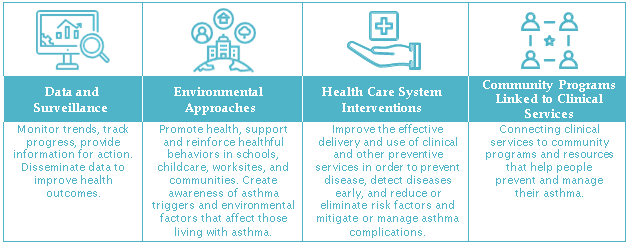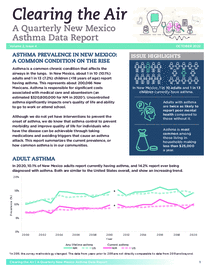Asthma Control Program
The New Mexico Asthma Control Program (NMACP) resides in the New Mexico Department of Health in the Environmental Health Epidemiology Bureau. The NMACP is funded by a 5-year (2019-2024) cooperative agreement with the Centers for Disease Control and Prevention (CDC) National Center for Environmental Health to develop strategies together with communities and health systems to improve and expand the reach of comprehensive asthma control services.
The NMACP works closely with the Asthma Council (NMCOA), which is a coalition of organizations and advocates sharing a vested interest in reducing the asthma disease burden in New Mexico. Its five-year strategic plan, Clearing the Air – Reducing the Burden of Asthma in New Mexico 2021-2025, serves as a guide to asthma stakeholders as they work toward improving asthma outcomes in the state.
CDC EXHALE Technical Package
The CDC Exhale Technical package is a resource to inform decision making. The strategies outlined below address asthma improvement and health care cost reduction. By using the package, we use evidence- supported approaches to address asthma through projects that utilize at least one of these strategies.
E - Education on asthma self-management
Education can focus on improving medication use, reduce exposures to triggers and better manage symptoms. It can be done in various settings such as clinics, pharmacies, schools and homes by medical providers, community health workers, and certified educators.
NMACP has recently funded an asthma clinic in Lea county and a school based project in Pojoaque.
X - Xtinguishing smoking and exposure to secondhand smoke
NMACP works closely with NUPAC (Nicotine Use Prevention and Control) to ensure providers have access to resources in our state.
H - Home visits for trigger reduction and asthma self-management education
This is closely tied to the Education strategy but can also include home environmental assessments for triggers.
NMACP funds training for Community Health Workers is an Asthma Specialty Track training.
A - Achievement of guidelines-based medical management
Effective ways to achieve this is through identifying asthma patients who would benefit from outreach or more interventions as well as trainings to medical providers.
NMACP funds the American Lung Association to provide education to clinics anywhere in New Mexico who are interested in enhancing their care for asthma patients. For more information visit: Asthma Quality Improvement: Enhancing Care for Children with Asthma.
NMACP and Children's Medical Services have partnered to identify children with asthma who visit the ER for asthma.
L - Linkages and coordination of care across settings for healthcare and social services
Ways to improve linkages include: quality improvement, medical homes, management programs and through school or community based programming.
E - Environmental policies or best practices to reduce asthma triggers from indoor, outdoor, and occupational sources
Examples include: Comprehensive smoke-free policies that prohibit smoking in all indoor spaces, reducing air pollution and asthma triggers in the workplace.
NMACP is funding an environmental justice project in Albuquerque Public Schools.
Four Domains of Chronic Disease Prevention
The CDC’s National Center for Chronic Disease Prevention and Health Promotion developed a framework to address risk factors for chronic disease on both the individual and the population level. The CDC emphasizes the importance of working at both levels and optimizing the efficiency and efficacy of public health initiatives. The recommended prevention efforts are in four key domains. Doing so helps organize, focus, and strengthen public health programs, enhance expertise, address gaps in services and build collaboration. NMCOA is using the domains to outline this strategic plan.

Quarterly Reports


